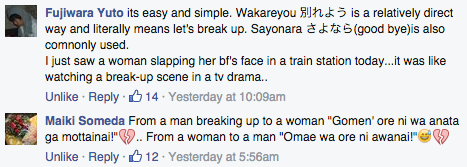I’m on the Japan Times Bilingual Page today: “To furu or furareru: In any lingo, breaking up is hard to do.” Sadly the piece is inspired by a true story.
As is my MO these days, I dug deep in the Chiebukuro for inspiration. Whenever I read Chiebukuro articles, I get the feeling that I’m accessing some secret part of the Japanese soul. The Internet really is where humans pour their deepest anxieties.
This post provided a concise explanation of the different between 振る and 捨てる:
振られる場合ごめんねって言って謝罪のお断りが付く場合があるけれど、捨てられる場合悪かったという気持ちさえもないでしょう残酷ですね。
Furareru is sometimes used in kind of I’m-sorry, apologetic cases, but suterareru is harsh and used when there are only bad feelings.
Pretty interesting to note.
One other little Easter Egg: An editor initially wanted to change the translation of ダニエルをふるなんて、もったいないね from “It’s a shame that she broke up with you” to “It’s a shame that she broke up with Daniel.”
This is very tempting for both Japanese and foreigners alike, but a quick check of the context shows why “you” is more appropriate: My friend was messaging me directly.
The only natural way to get “you” in Japanese is often to use someone’s surname, and in the case of foreigners, it’s regular practice to go with the first name. あなたをふるなんて、もったいないね just isn’t a phrase that you’ll see in Japanese very often, especially between two friends who aren’t romantically involved.
Another side note: I also love checking out the comments when the JT shares the article on Facebook. Here are some good ones:


